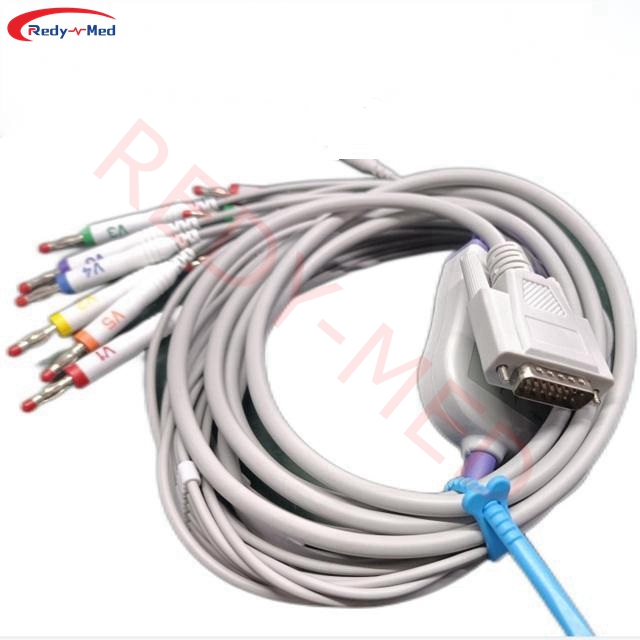
- Home > News > Industry News
Empowering Healthcare: The Role of EKG Cables in Patient Monitoring
2024-01-17 03:08:03
Introduction: Enhancing Medical Care through Advanced EKG Cables

In the realm of modern healthcare, technology plays a vital role in delivering accurate diagnoses and effective treatments. One such technological innovation, electrocardiography (EKG), has revolutionized patient monitoring by providing valuable insights into cardiac health. However, behind this life-saving diagnostic tool lies an indispensable component – EKG cables. This article delves into the pivotal role of EKG cables in patient monitoring, highlighting their significance in empowering healthcare professionals to deliver superior medical care.
1. Understanding EKG Cables: Connecting the Dots of Cardiac Health
EKG cables serve as the crucial link between patients and EKG machines, transmitting vital electrical signals from the body to the monitoring device. These cables consist of multiple leads, which are adhesive patches attached to specific locations on the patient's chest, limbs, or torso. Each lead captures a unique electrical signal, enabling healthcare practitioners to visualize the heart's electrical activity accurately.
This comprehensive network of EKG cables facilitates the creation of a detailed electrocardiogram, a graphical representation of the heart's electrical rhythmicity. Medical professionals rely on these EKG readings to diagnose cardiac abnormalities such as arrhythmias, heart attacks, and other heart-related disorders, thereby ensuring timely and precise interventions.
2. Design and Functionality: Advancements for Enhanced Patient Care
Over the years, significant advancements have been made in the design and functionality of EKG cables, enhancing the quality and reliability of patient monitoring. Modern EKG cables are engineered to deliver exceptional signal transmission, minimizing interference and artifacts that could compromise diagnostic accuracy.
The integration of advanced shielding technologies, such as twisted-pair or coaxial cables, reduces external noise and mitigates signal degradation. Additionally, the emergence of wireless EKG cables enables greater freedom of movement for patients, enhancing comfort during prolonged monitoring sessions.
3. Durability and Patient Safety: Ensuring Longevity and Reliability
EKG cables are subjected to rigorous usage, necessitating designs that prioritize durability and patient safety. Manufacturers employ high-quality materials, such as flexible and hypoallergenic connectors and lead wires, to minimize the risk of skin irritation and allergic reactions.
Frequent sterilization and disinfection are essential in healthcare settings, and EKG cables are no exception. Cables with detachable leads are preferred, as they simplify the cleaning process while maintaining optimum performance. Moreover, advancements in cable materials and construction have led to the emergence of disposable EKG cables, reducing the risk of cross-contamination and ensuring patient safety.
4. Compatibility and Standardization: Interoperability for Seamless Integration
Efficient integration of EKG cables with various monitoring devices and electronic health records (EHR) systems is crucial for streamlining healthcare operations. Standardized cable designs and connector types promote interoperability, ensuring compatibility across different manufacturers and healthcare facilities.
Furthermore, the adoption of industry-wide protocols, such as Health Level Seven (HL7) standards, facilitates the seamless exchange of EKG data between different systems. This interoperability enhances medical decision-making by enabling comprehensive analysis of patient health records and facilitating remote monitoring, ultimately improving patient outcomes.
5. The Future of EKG Cables: Innovations and Advancements
The future of EKG cables holds tremendous promise for improving patient monitoring and healthcare outcomes. Ongoing research and development efforts aim to enhance the efficiency, accuracy, and ease of use of EKG cables.
Technological advancements, such as the integration of artificial intelligence algorithms, are being explored to automate the EKG analysis process, reducing the burden on healthcare professionals and enabling faster diagnoses. Moreover, the utilization of flexible and wireless EKG cables is expected to further improve patient comfort and mobility during monitoring.
Conclusion
EKG cables form the backbone of modern patient monitoring, empowering healthcare professionals to deliver superior medical care. By understanding the significance of EKG cables in facilitating accurate cardiac diagnoses, considering advancements in design, prioritizing durability and patient safety, promoting compatibility and standardization, and embracing future innovations, we can ensure a future where patient monitoring is maximized, ultimately leading to enhanced healthcare and better patient outcomes.
Get the latest price? We'll respond as soon as possible(within 12 hours)




